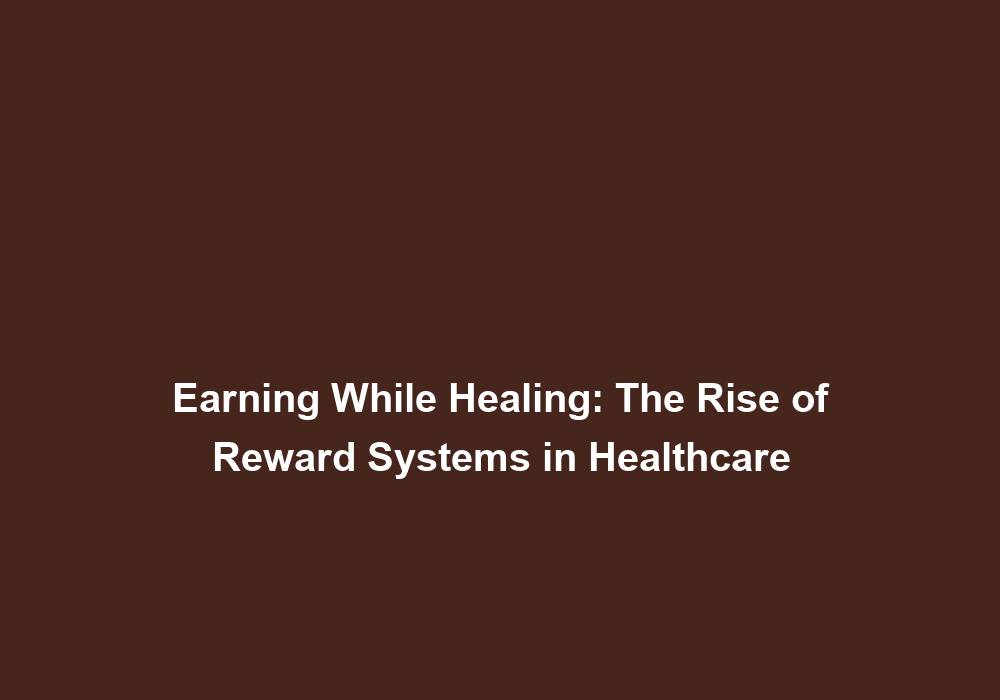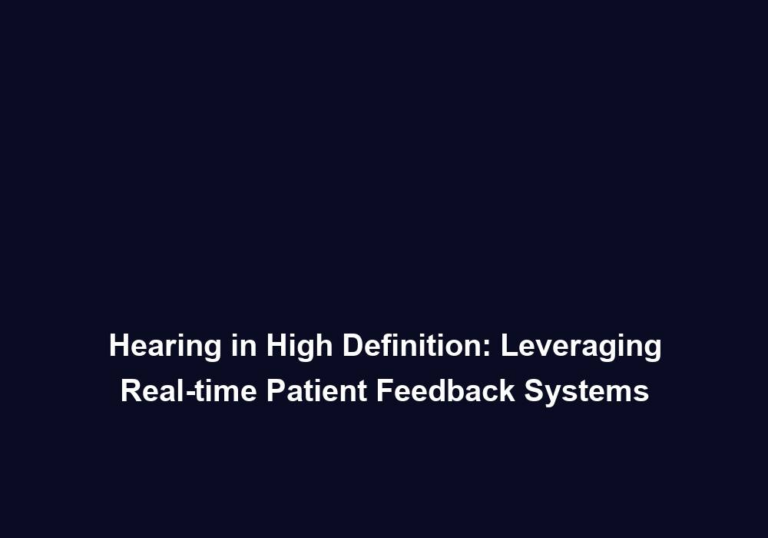Earning While Healing: The Rise of Reward Systems in Healthcare
The healthcare industry has been witnessing a significant transformation in recent years, not only in terms of medical advancements but also in the way healthcare professionals are being recognized and rewarded. The emergence of reward systems in healthcare has revolutionized the industry, providing opportunities for healthcare professionals to earn while they heal. These systems offer various incentives and bonuses, aiming to motivate and retain talented individuals in the challenging field of healthcare. In this article, we will explore the rise of reward systems in healthcare and their impact on healthcare professionals.
Understanding Reward Systems in Healthcare
Reward systems in healthcare are designed to recognize and appreciate the dedication and hard work of healthcare professionals. These systems provide both financial and non-financial incentives to motivate and engage healthcare professionals in their work. The rewards can vary from monetary bonuses, promotions, and salary increments to recognition, career development opportunities, and flexible work arrangements.
Reward systems help healthcare professionals feel valued and appreciated for their efforts, which creates a positive work environment. This, in turn, boosts morale and motivation among healthcare professionals, leading to increased job satisfaction. Additionally, these systems contribute to the overall well-being of healthcare professionals by providing them with opportunities for career growth and work-life balance.
The Need for Reward Systems in Healthcare
The healthcare industry is known for its demanding nature and high levels of stress. Healthcare professionals often work long hours, deal with complex situations, and face emotional challenges. Recognizing their efforts and providing rewards is crucial to maintain their motivation, job satisfaction, and overall well-being. Reward systems play a vital role in addressing burnout, reducing turnover rates, and attracting top talent to the healthcare industry.
By implementing reward systems, healthcare organizations can show their appreciation for the hard work and dedication of healthcare professionals. These systems help alleviate the stress and pressure that healthcare professionals face on a daily basis, making them feel valued and supported. This, in turn, leads to increased job satisfaction and a higher likelihood of healthcare professionals staying in their roles for the long term.
The Benefits of Reward Systems in Healthcare
Implementing reward systems in healthcare brings numerous benefits for both healthcare professionals and healthcare organizations. Some of the key benefits include:
1. Increased Job Satisfaction
Reward systems contribute to higher job satisfaction among healthcare professionals. By recognizing their hard work and dedication, these systems create a positive work environment, boosting morale and motivation. When healthcare professionals feel valued and appreciated, they are more likely to be satisfied with their jobs, leading to improved patient care and outcomes.
In addition to financial incentives, reward systems can include non-financial rewards such as recognition and career development opportunities. These rewards further enhance job satisfaction by providing healthcare professionals with a sense of fulfillment and personal growth.
2. Improved Retention Rates
High turnover rates pose a significant challenge for healthcare organizations. By implementing reward systems, healthcare organizations can enhance employee retention. The incentives and bonuses offered through these systems act as powerful tools for attracting and retaining talented healthcare professionals. This, in turn, helps organizations maintain a stable workforce and reduce recruitment costs.
Reward systems create a sense of loyalty and commitment among healthcare professionals. When they feel valued and rewarded for their contributions, they are more likely to stay with the organization for the long term. This reduces turnover rates, which can be costly and disruptive to healthcare organizations.
3. Enhanced Patient Care
Reward systems indirectly contribute to the quality of patient care. When healthcare professionals are motivated, satisfied, and appreciated, they are more likely to provide high-quality care to their patients. The positive work environment created by reward systems fosters teamwork, collaboration, and a patient-centered approach, leading to improved patient satisfaction and outcomes.
Healthcare professionals who feel valued and supported are more likely to go the extra mile to ensure the well-being of their patients. They are also more likely to engage in continuous learning and improvement, which further enhances the quality of patient care.
4. Attracting Top Talent
In a competitive job market, healthcare organizations need to attract and retain top talent. Reward systems play a crucial role in attracting highly skilled healthcare professionals. The prospect of earning attractive bonuses, receiving recognition, and enjoying career development opportunities makes a healthcare organization stand out as an employer of choice. This allows healthcare organizations to build a strong workforce capable of delivering excellent care.
By offering competitive rewards and incentives, healthcare organizations can differentiate themselves from other employers in the industry. This helps them attract top talent and position themselves as leaders in the healthcare field.
5. Boosting Employee Engagement
Employee engagement is vital in any industry, including healthcare. Reward systems enhance employee engagement by providing healthcare professionals with a sense of purpose and accomplishment. When employees feel engaged, they are more likely to go the extra mile, be innovative, and contribute positively to the organization’s success.
Reward systems create a culture of appreciation and recognition, which fosters a sense of belonging and pride among healthcare professionals. This, in turn, leads to higher levels of engagement and productivity, benefiting both the healthcare professionals and the organization as a whole.
Types of Reward Systems in Healthcare
Reward systems in healthcare can take various forms, depending on the organization’s goals, resources, and culture. Some commonly used reward systems include:
1. Performance-Based Incentives
Performance-based incentives are designed to reward healthcare professionals based on their individual performance and achievements. These incentives can be in the form of monetary bonuses, salary increments, or additional benefits such as flexible working hours or vacation time.
Performance-based incentives provide healthcare professionals with tangible rewards for their hard work and exceptional performance. This motivates them to continuously strive for excellence and contribute to the overall success of the organization.
2. Recognition Programs
Recognition programs aim to acknowledge and appreciate the contributions of healthcare professionals. These programs can include awards, certificates, public recognition, or even simple gestures like thank-you notes. Recognizing exceptional performance and dedication boosts morale and motivates healthcare professionals to continue their excellent work.
Recognition programs create a culture of appreciation and celebration within healthcare organizations. They highlight the value of each healthcare professional’s contributions and foster a sense of pride and accomplishment.
3. Career Development Opportunities
Career development opportunities are valuable rewards for healthcare professionals. These opportunities can include funding for further education and training, mentorship programs, or promotions to higher positions. Investing in the professional growth and development of healthcare professionals not only benefits them individually but also improves the overall quality of healthcare.
By offering career development opportunities, healthcare organizations demonstrate their commitment to the growth and advancement of their healthcare professionals. This helps attract and retain talented individuals who are motivated to continuously improve their skills and knowledge.
4. Work-Life Balance Initiatives
In recognition of the demanding nature of healthcare professions, many organizations offer work-life balance initiatives as rewards. These initiatives can include flexible working hours, telecommuting options, or additional time off. By promoting work-life balance, healthcare organizations contribute to the well-being and job satisfaction of their employees.
Work-life balance initiatives help healthcare professionals maintain a healthy work-life integration, reducing stress and burnout. This, in turn, leads to higher levels of job satisfaction and overall well-being.
Conclusion
The rise of reward systems in healthcare has brought about positive changes in the industry. These systems recognize the efforts and dedication of healthcare professionals, offering them incentives and rewards that go beyond monetary compensation. The benefits of reward systems are far-reaching, including increased job satisfaction, improved retention rates, enhanced patient care, and the attraction of top talent. Healthcare organizations must continue to invest in these systems to ensure the well-being and motivation of their healthcare professionals, ultimately leading to better healthcare outcomes for all.







